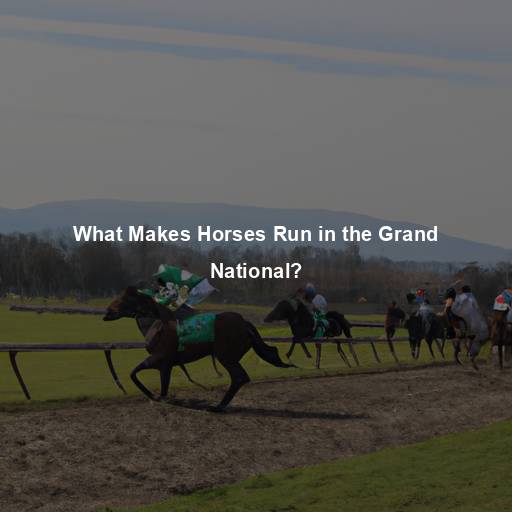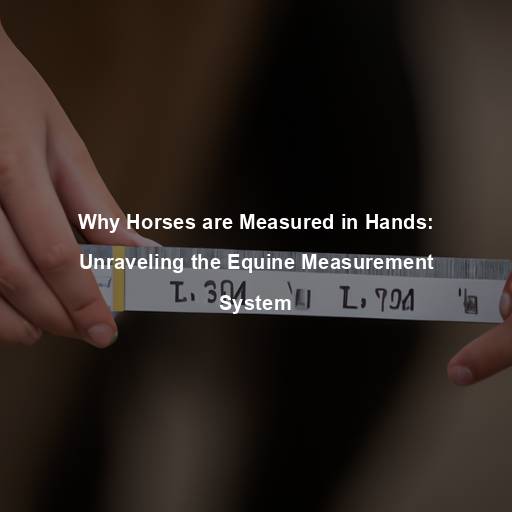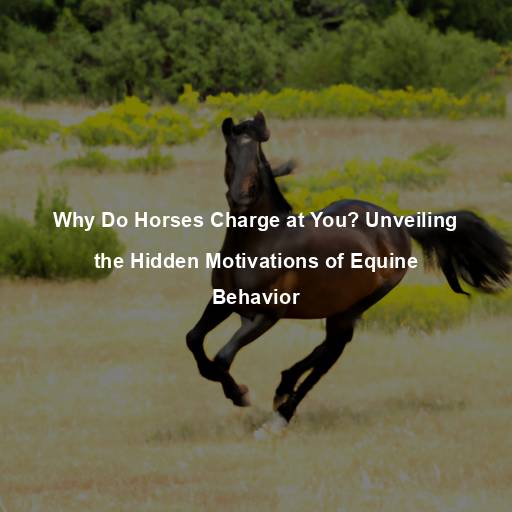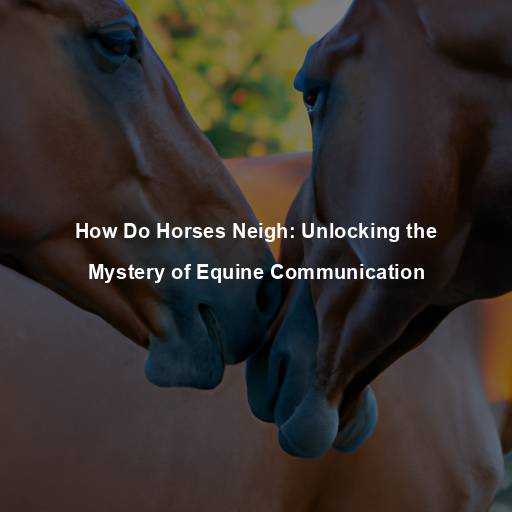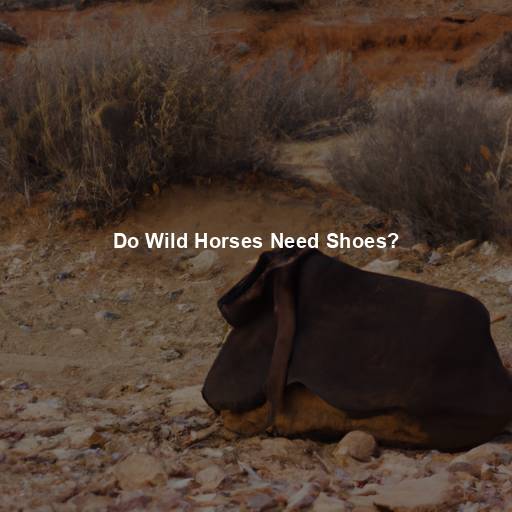What Makes Horses Run in the Grand National?
Last Updated on October 19, 2023 by Evan
Contents
- 1 The Grand National: A Legendary Race
- 2 The Equine Spirit: A Natural Instinct to Run
- 3 The Thrill of Competition: Horses as Athletes
- 4 The Bond Between Horse and Rider: Trust and Partnership
- 5 The Pursuit of Glory: Prestige and Recognition
- 6 The Love of the Sport: Passion and Dedication
- 7 The Call of the Wild: Embracing Their Ancestral Roots
- 8 The Unbreakable Spirit: A Test of Courage and Resilience
- 9 The Importance of Breeding: Genetics and Bloodlines
- 10 The Human Factor: Trainers, Jockeys, and Support Teams
- 11 FAQs – What Horses Running in Grand National
The Grand National: A Legendary Race
The Grand National is a world-renowned horse race that captures the hearts and imaginations of millions of spectators each year. This iconic steeplechase event, steeped in history and tradition, tests the mettle of both horse and rider over a grueling course of four and a half miles, featuring formidable fences and challenging terrain. But what motivates these magnificent creatures to run with such fervor in the Grand National? Let’s delve into the fascinating world of horse racing to understand the driving force behind their powerful strides.
The Equine Spirit: A Natural Instinct to Run
Throughout history, horses have been undeniably linked to their primal instinct: running. Born runners, these majestic creatures have a rich ancestry rooted in the vast landscapes they once roamed. From the untamed realms that fueled their existence, they evolved, honing their remarkable speed, endurance, and agility over millennia. Today, even in domestication, their innate yearning to gallop free continues to pulsate within their genes, a testament to their enduring spirit.
The Thrill of Competition: Horses as Athletes
From the boundless energy coursing through their veins to the undeniable grace with which they maneuver the hurdles, horses are natural-born competitors. With their hearts pounding in their chests, they charge through the Grand National, defying their limits and defying expectations. Surrounded by a symphony of galloping hooves and the chorus of boisterous onlookers, these majestic beings embody the true essence of competition. It is a sight that elicits wonder and astonishment, leaving us in a state of awe and admiration for the extraordinary athletes that they are.
The Bond Between Horse and Rider: Trust and Partnership
Horses are not just racing machines; they are intelligent and sentient beings that form deep bonds with their riders. The relationship between a horse and its jockey is built on trust, respect, and mutual understanding. The Grand National is the ultimate test of this partnership, where horse and rider must work in perfect harmony to navigate the treacherous course. The emotional connection between them fuels their determination to give their all and tackle any obstacle that comes their way.
The Pursuit of Glory: Prestige and Recognition
The Grand National is not only a test of physical prowess but also a quest for glory. Winning this prestigious race elevates a horse’s status to legendary proportions and cements its place in the annals of horse racing history. Trainers, owners, jockeys, and fans all yearn for the thrill of victory and the chance to etch their names into the record books. This pursuit of glory serves as a powerful motivator, driving horses to push their limits and leave no stone unturned in their quest for greatness.
The Love of the Sport: Passion and Dedication
Beyond the allure of fame and glory, horses run in the Grand National because they simply love to race. It is their passion, their reason for being. From the moment they set foot on the track, their hearts fill with an indescribable joy, and their spirits soar with each stride. The bond between horse and rider, the thrill of competition, and the thunderous applause of the crowd all contribute to the exhilarating experience that fuels their love for the sport.
The Call of the Wild: Embracing Their Ancestral Roots
Hidden beneath their domesticated exteriors, horses retain a flicker of wildness that yearns to break free. The illustrious Grand National race, steeped in its treacherous obstacles and daring leaps, reignites their primal instincts and stirs their untamed essence. Here, within the confines of controlled chaos, these majestic creatures tap into their ancestral heritage, rediscovering a fleeting taste of the boundless freedom and electrifying rush their undomesticated brethren once savored. Galloping through the hallowed turf of the Grand National unleashes a dormant spirit, a symphony of liberation pulsating through their veins.
The Unbreakable Spirit: A Test of Courage and Resilience
In the thrilling spectacle known as the Grand National, elegant creatures known as horses take center stage, mesmerizing us with their indomitable spirits. What compels these majestic beings to embark on this daring pursuit, facing formidable obstacles without hesitation? It is their unyielding courage and resilience that fuel their unwavering resolve to conquer the seemingly insurmountable. Towers of fences loom before them, treacherous ditches beckon at every turn, and yet, they charge forward, defying the odds and embracing the tumultuous journey that lies ahead.
In conclusion, horses run in the Grand National for a multitude of reasons. Their natural instinct to run, their competitive spirit, the bond with their riders, the pursuit of glory, the love of the sport, the call of the wild, and their unbreakable spirit all intertwine to create a captivating spectacle that captivates audiences worldwide. As we witness these majestic creatures galloping towards the finish line, we can’t help but marvel at their strength, grace, and unwavering passion for the sport. The Grand National is not just a race; it is a celebration of the indomitable spirit of the horse.
Prepare for the thrill of a lifetime as we delve into the clandestine world of Grand National training, where mystery and hard work intertwine. The journey towards equine triumph is not for the faint of heart – a saga of tireless dedication and relentless scrutiny. Only through a meticulous combination of physical prowess and unwavering mental fortitude can these noble creatures conquer the daunting obstacles that lie ahead on race day. Join us on this enigmatic voyage as we unravel the secrets behind their awe-inspiring performance.
Physical Conditioning: Building Strength and Endurance
Training for the Grand National begins with building a solid foundation of physical fitness. Horses engage in a variety of exercises to enhance their strength, stamina, and cardiovascular fitness. They undergo regular workouts, including long gallops, interval training, and hill work, to develop the necessary muscular strength and aerobic capacity required for the demanding racecourse.
Jumping Practice: Mastering the Fences
The Grand National is renowned for its breathtaking displays of horsemanship, particularly the heart-stopping hurdles that send both jockeys and spectators into a frenzy. These awe-inspiring fences, with their daunting ditches and towering barriers, present a true test of courage and skill. In preparation, horses undergo a rigorous training regimen, gradually acclimating to simulated obstacles of escalating complexity. With each jump, they cultivate the precision and self-assurance necessary to conquer the arduous course ahead.
Cross-Country Training: Familiarizing with Different Terrains
The Grand National course encompasses diverse terrains, from lush grass to soft ground and from flat stretches to undulating tracks. To prepare for these variations, horses engage in cross-country training. They are exposed to different surfaces, gradients, and conditions, allowing them to adapt and perform optimally regardless of the terrain they encounter during the race.
Mental Preparation: Building Focus and Resilience
Mental preparation is just as crucial as physical conditioning when it comes to the Grand National. Horses are intelligent animals that require mental stimulation and preparation to perform at their best. Trainers employ various techniques, such as desensitization exercises and exposure to racecourse environments, to familiarize horses with the sights, sounds, and crowds they will encounter on race day. This helps horses remain focused, composed, and resilient amidst the excitement and chaos of the event.
Nutrition and Rest: Fueling and Recovery
When it comes to a horse’s training program, there’s so much more than meets the eye. The secret to a successful regime lies in the perfect blend of nutrition and rest – a true balancing act for these majestic creatures. With their intense physical workouts, horses need more than just any old diet. It takes the expertise of equine nutritionists and trainers to craft personalized feeding plans that cater to every horse’s unique needs.
The Importance of Breeding: Genetics and Bloodlines
When it comes to the Grand National, it’s not all about sweat and training. We need to delve into the enigmatic world of horse genetics to truly understand what makes a winner. From their physical traits to their racing prowess, bloodlines hold the key to a horse’s destiny on this esteemed racecourse. Join us as we unravel the mysteries of breeding and delve into the realm of uncertainty where genetics meets the Grand National.
Inheritance of Physical Traits: Speed, Stamina, and Jumping Ability
Through selective breeding, breeders aim to pass on desirable physical traits to future generations. Speed, stamina, and jumping ability are key attributes sought after in Grand National contenders. Horses with a lineage of successful racehorses are more likely to inherit these traits, giving them a natural advantage on the racecourse. However, it is important to note that breeding alone does not guarantee success; a horse’s training and development are equally crucial.
The Influence of Sire and Dam: Pedigree Analysis
Analyzing a horse’s pedigree provides valuable insights into its racing potential. The sire (father) and dam (mother) contribute their genetic material, which can significantly impact the offspring’s performance. Studying the pedigree helps identify patterns of success within a bloodline, providing breeders and trainers with valuable information when selecting racehorses. Horses with a lineage of previous Grand National winners or successful steeplechasers often carry the legacy of their ancestors and are considered prime contenders.
The Role of Hybrid Vigor: Outbreeding for Performance Enhancement
Hybrid vigor, also known as heterosis, refers to the increased performance and vitality observed in offspring resulting from the mating of genetically diverse parents. Breeders often employ outbreeding techniques, such as crossbreeding or introducing new bloodlines, to enhance performance characteristics in their horses. By bringing together different genetic backgrounds, breeders aim to capitalize on hybrid vigor and potentially produce superior athletes capable of excelling in the Grand National.
The Human Factor: Trainers, Jockeys, and Support Teams
While horses are undoubtedly the stars of the Grand National, the human element also plays a crucial role in their success. Trainers, jockeys, and a dedicated support team work in tandem to prepare the horse for the race, make strategic decisions, and provide the necessary care and guidance. Let’s explore the impact of these key individuals in the journey towards Grand National glory.
Trainers: Architects of Success
Trainers are the architects behind a horse’s training program. They possess a wealth of knowledge and experience in horsemanship and use their expertise to create a tailored training regimen for each horse. Trainers closely monitor the horse’s progress, make adjustments to the training program as needed, and ensure the horse reaches its peak physical and mental condition on race day. Their invaluable guidance and attention to detail significantly contribute to a horse’s chances of success in the Grand National.
Jockeys: Skilled and Fearless Athletes
Jockeys are the skilled athletes who guide the horses during the race. They possess exceptional riding skills, a deep understanding of race strategy, and a fearless determination to succeed. Jockeys must establish a strong rapport with their assigned horse, understanding its temperament, strengths, and preferences. Their ability to make split-second decisions, navigate challenging obstacles, and maintain composure amidst the intense competition can make all the difference in the outcome of the race.
Support Teams: The Backbone of the Operation
Behind every successful horse and rider duo, there is a dedicated support team working tirelessly behind the scenes. Grooms, stable staff, veterinarians, farriers, and other professionals ensure the horse’s well-being, provide essential care, and address any health or logistical issues that may arise. Their expertise and unwavering commitment contribute to the overall success of the horse and its chances of performing at its best in the Grand National.
The Grand National is an enchanting spectacle that defies explanation. There is an inexplicable allure that propels horses to gallop with fiery desire, as if driven by an unseen force. It is a manifestation of their inherent nature, deeply rooted in their primordial instincts, to unleash their untamed prowess and chase after triumph. With the guidance of skilled trainers and the partnership of talented jockeys, these magnificent creatures become vessels of sheer determination, captivating audiences with their unwavering spirit and astounding physical prowess.
FAQs – What Horses Running in Grand National
What is the Grand National?
Unveiling the pulse-racing extravaganza, the Grand National emerges as a legendary spectacle, where horse racing and adrenaline converge in perfect harmony every year at the esteemed Aintree Racecourse. Nestled in the heart of Liverpool, England, this handicap steeplechase race spans a daunting 4 miles and 514 yards, spanning a thrilling six kilometers. With a labyrinth of fences and treacherous obstacles dotting the course, the Grand National dishes up an electrifying cocktail of suspense and wonder, captivating both the intrepid competitors and awe-struck spectators alike.
How many horses run in the Grand National?
In the thrilling world of horse racing’s most anticipated event, the Grand National, the beloved tradition of allowing a maximum of 40 magnificent horses to showcase their speed and skill has captured the hearts of racing enthusiasts worldwide. This carefully curated field size strikes the perfect balance between exhilarating competition and the utmost priority of ensuring the safety and well-being of both the gallant steeds and their fearless jockeys. Yet, with the unpredictability inherent in this equestrian spectacle, the final count of participants can teeter on the precipice of uncertainty, swayed by the whims of entries and the calculated deliberation of the race organizers.
How are the horses selected to run in the Grand National?
As the anticipation builds for the renowned Grand National, the intricate selection process that determines which magnificent horses will grace the prestigious event leaves enthusiasts in a state of exhilarating wonder. A delicate dance between rankings, weights, and qualifying races shapes the destiny of these equine athletes. With each horse assigned a weight aligned with their past accomplishments, the challenge lies in balancing the scales to ensure a fair and riveting competition. Moreover, to stir an alluring aura of mystery, these noble creatures must not only carry their burdens but also prove their mettle in designated races, meeting performance standards that pave the way to the grandest stage of them all – the Grand National.
Do famous or well-known horses usually participate in the Grand National?
Year after year, the allure of the Grand National captivates horse racing enthusiasts, drawing in renowned steeds from all corners of the globe. Esteemed trainers and owners invest tireless efforts to meticulously prepare their prized horses for this momentous occasion. Legacies intertwined with noble bloodlines, remarkable triumphs in previous races, and impressive track records gracefully gallop side by side in the fiercely contested Grand National. Yet, the race’s enigmatic nature effortlessly defies logic, injecting waves of unpredictability that leaves even the most astute minds perplexed.
Are there any favorite horses for the upcoming Grand National?
As the Grand National draws closer, horse racing enthusiasts and bookmakers will begin to identify potential favorites based on horses’ recent form, ratings, and performances in key preparatory races. The odds for each horse will fluctuate as more information becomes available and closer to the race day. It is always exciting to follow the discussions and predictions surrounding the favorites, but it is important to remember that anything can happen in horse racing, making every horse a worthy contender.

